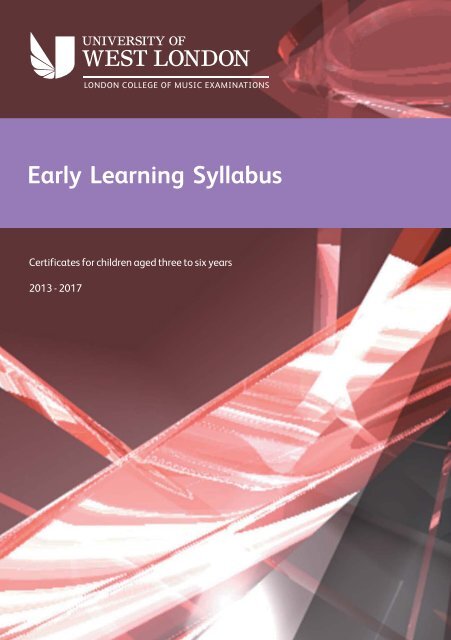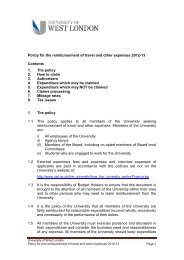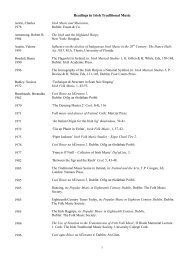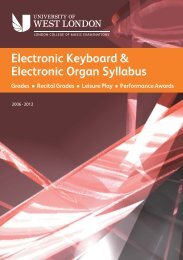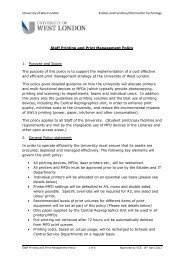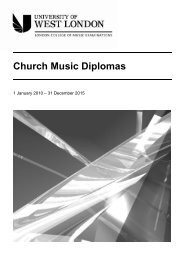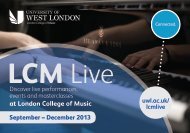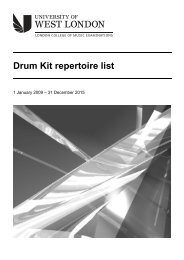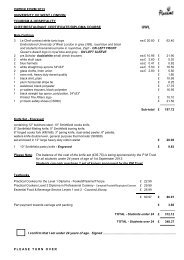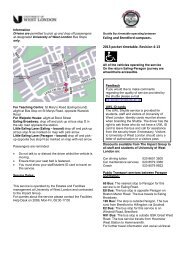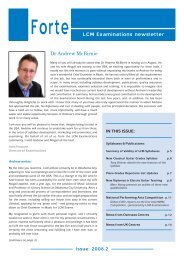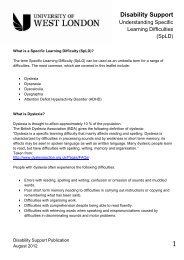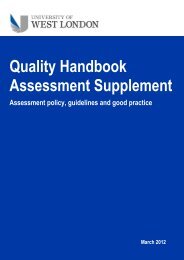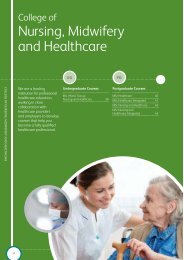LCM Exams - Early Learning Syllabus - University of West London
LCM Exams - Early Learning Syllabus - University of West London
LCM Exams - Early Learning Syllabus - University of West London
- No tags were found...
Create successful ePaper yourself
Turn your PDF publications into a flip-book with our unique Google optimized e-Paper software.
<strong>LCM</strong> ExaminationsDirector <strong>of</strong> ExaminationsJohn Howard BA PhDChief Examiner in MusicPhilip Aldred BEd F<strong>LCM</strong>Chief Examiner in Drama & CommunicationStephen Hazell MA PhD<strong>LCM</strong> Examinations<strong>University</strong> <strong>of</strong> <strong>West</strong> <strong>London</strong>St Mary’s RoadEaling<strong>London</strong> W5 5RFtel: +44 (0)20 8231 2364email: lcm.exams@uwl.ac.ukuwl.ac.uk/lcmexams© Copyright 2013 by the <strong>University</strong> <strong>of</strong> <strong>West</strong> <strong>London</strong>, <strong>LCM</strong> Examinations
<strong>London</strong> College <strong>of</strong> Music ExaminersAchini Abeygunawardene F<strong>LCM</strong> FVCM LTCL ALAMPhilip Aldred BEd F<strong>LCM</strong> [Chief Examiner in Music]William Alexander BSc BMus MBA MMus PhD GRIC FTCL ARCM ATCLCertFAE *Helen ArthurMarie Barry BA F<strong>LCM</strong> ALSM ALAMDavid Beer BA PGCE F<strong>LCM</strong>John Beilby BMus PhD MTC(Lond) G<strong>LCM</strong> F<strong>LCM</strong> LRAM LTCL HonFIEMS †Erica Beynon MA F<strong>LCM</strong> L<strong>LCM</strong> A<strong>LCM</strong>John Branton FVCM LVCM(TD) AMusVCM CT(VCM) ATM(SMTC) HonVCMJoshua Brown BA LTCL PGCEKeith Brown BMus A<strong>LCM</strong> PGCECatherine Burnham BMus LTCL PGCEDorothy Carnegie BMus PGCEPaul Carter BMus MA DASM A<strong>LCM</strong> PGCE FRSARebecca Chambers GRNCM PGRNCMAlice Chua MA F<strong>LCM</strong> ATCLGerald Collins L<strong>LCM</strong>(TD)Justin Connolly BMus ARCM F<strong>LCM</strong>Peter Cook G<strong>LCM</strong> F<strong>LCM</strong> FVCM PGCE *Stuart Corbett BA FDipMus FVCM(Hons) LTCL L<strong>LCM</strong> PGCE *Jamie Cordell BMus PGDipHannah Cott BMusBarbara Courtney-King LRAM ARCMSandra Cromie BA L<strong>LCM</strong>(TD) A<strong>LCM</strong> PGCEBronagh DaveyPatrick Davey BMus MA TTCTKatherine Denton BMus LRAM DipABRSMJanet Dowsett F<strong>LCM</strong> *Barry Draycott MusB FTCL F<strong>LCM</strong> ARCM ARCO Hon<strong>LCM</strong> *David Edwards BEd LGSMJennifer Fisher DipRAM LRAM BMus GSMDIvor Flint A<strong>LCM</strong> L<strong>LCM</strong>(TD)Mairead FordeSheila Gaskell FTCL LRAM L<strong>LCM</strong>Aidan Geary G<strong>LCM</strong>Kathleen Gilbert LRAM ARCM DipEdKevin Gill FRCO GBSM LTCLNicola GillanCoral Gould MBE LRAM ARCM LTCL CertEdMoira Gray F<strong>LCM</strong> LRAM LTCL ARCM DipMus(Open)Yolande Gregor-Smith LRSM ARCM DipTESOLNigel Groome G<strong>LCM</strong> ARSCM F<strong>LCM</strong> *Peter Hallam BEd MA LTCLMary Hamilton GTCL LTCL Dip.Acad.di Sta.Cecilia RomeMary Hardy-Green L<strong>LCM</strong>Paul Harrison MA G<strong>LCM</strong> F<strong>LCM</strong> L<strong>LCM</strong>(TD) LTCL PGCEAndrew Hatt BA Hon<strong>LCM</strong>Stephen Hazell BA PhD [Chief Examiner in Drama and Communication]Sheila Hemming L<strong>LCM</strong> ARCM Hon<strong>LCM</strong>Ann Hohenkerk A<strong>LCM</strong>John Howard BA PhD [Director <strong>of</strong> Examinations]Vic HylandDeborah Jones BA DipMus A<strong>LCM</strong>Daithi Kearney BA HDipEd TTCT PhDChris Kimber GGSMRichard Lambert BEd MA A<strong>LCM</strong> FRSA *Robert LangstonElizabeth Lannigan A<strong>LCM</strong>Tara Leiper BEd MA LTCL L<strong>LCM</strong>(TD) ARCM DipABRSMJayne Lewis BA PGCEJayne Lindgren LLAM †Jocelyn Lord MA F<strong>LCM</strong> LGSM LLAM ACSD †Helen Madden GC<strong>LCM</strong>Susan Maguire BA HDipEd DipItal L<strong>LCM</strong>(TD) A<strong>LCM</strong> EFLCertRobert Marsh MA FRSA FRCO ARCMAndrew McBirnie BA MMus PhD LTCL *Avril McCusker BA PGDE DRSAMDRay McGinley A<strong>LCM</strong>Paula McKernan LLB A<strong>LCM</strong>(TD)Andrew McManus BMus GBSM F<strong>LCM</strong> ABSM(TD) ACertCM TEFL(Dip)Neil Millensted MA FTCL LRAM ARCMMichael Milner LGSM A<strong>LCM</strong>John Mitchell L<strong>LCM</strong> A<strong>LCM</strong> DipTCL PGCEJoyce Mitchell F<strong>LCM</strong> L<strong>LCM</strong> A<strong>LCM</strong>Susan Olden LRAM L<strong>LCM</strong>(TD) ARCM AMusTCLAtes Orga BMus FTCL LMusTCL ATCLGillian Patch MusB MMus PGDip L<strong>LCM</strong> LTCL LGSM HonF<strong>LCM</strong> *Gordon Pearce MA PhD FRSA F<strong>LCM</strong> LTCL ARCMChristine Peet BA MEd CertEdTony Pegler F<strong>LCM</strong>Maxwell Pettitt BMus MMus ARCM A<strong>LCM</strong> FRSAKathleen Phillips LGSM A<strong>LCM</strong>Elizabeth Pipe F<strong>LCM</strong> MMusPeter Precious GradDipMusJenifer Pressdee LGSM ANEAYvette Price BMus A<strong>LCM</strong>(TD)Nigel Ramage MA DipEd †Peter Reder MA G<strong>LCM</strong> ACSD †Michael Regan BMus MMus LGSM HonF<strong>LCM</strong>Nathan Rose BMus PGDip A<strong>LCM</strong>Claire Rubman PhD F<strong>LCM</strong> L<strong>LCM</strong>(TD)Gibson Russell GRSM LRAM ARCM HonF<strong>LCM</strong>Ian Seddon F<strong>LCM</strong> ATCL ARCODave Simpson LGSMTony Skinner FRSAElaine Smith G<strong>LCM</strong> L<strong>LCM</strong> HonF<strong>LCM</strong> *Alison Sparrow BAJennifer Speculand F<strong>LCM</strong> FSTD L<strong>LCM</strong>(TD) LGSM ALAM †Christopher Stanbury BMus MMus F<strong>LCM</strong>Felicity Stubbs MA F<strong>LCM</strong> G<strong>LCM</strong>Paul Swain BSc L<strong>LCM</strong> Hon<strong>LCM</strong>Christopher Tinker PhD GRSM ARCM PGCEJ Godfrey Turner F<strong>LCM</strong> LTCL LRAM ARCM MCollPLeo Turner LTCL L<strong>LCM</strong> LGSMChristopher Tutin BMus MA LRSM A<strong>LCM</strong> CertRCOFintan Vallely PhD MA BScMichael Venables BA PGCEJill Wallis BEd F<strong>LCM</strong> LTCLRichard Walsh BA MPhil F<strong>LCM</strong>John Warren BMus GMus F<strong>LCM</strong> LGSM LTCL ACertCM CertEdTonni Wei LMusVCM ARCMDavid Whittaker G<strong>LCM</strong> F<strong>LCM</strong> L<strong>LCM</strong>(TD) *Peter J Williams G<strong>LCM</strong> MBA F<strong>LCM</strong> L<strong>LCM</strong>(TD) NPQHWei Wong G<strong>LCM</strong> L<strong>LCM</strong>(TD) PGCE Hon<strong>LCM</strong>Carol Woods MA GRSM ARMCM* denotes Senior Examiner in Music † denotes Senior Examiner in Drama and Communication[This list was correct at the time <strong>of</strong> printing.]
<strong>London</strong> College <strong>of</strong> MusicThe <strong>London</strong> College <strong>of</strong> Music (<strong>LCM</strong>) is one <strong>of</strong> the largest specialist Music and Performing Arts institutes in the UK. Ithas a long history <strong>of</strong> music education dating back to 1887, when it was situated in Great Marlborough Street,<strong>London</strong>, where the college began as an examination body. In 1991 <strong>LCM</strong> became part <strong>of</strong> Thames Valley <strong>University</strong>,which was renamed the <strong>University</strong> <strong>of</strong> <strong>West</strong> <strong>London</strong> in 2011.The <strong>London</strong> College <strong>of</strong> Music <strong>of</strong>fers an impressive range <strong>of</strong> innovative courses, respected worldwide and deliveredwith creativity and passion by practising industry experts. Courses include Performance and Composition, PopularMusic Performance and Recording, Performing Arts, Music Management, Music Technology and Theatre Production.Further information about full-time programmes for undergraduate and postgraduate students, in addition to theJunior College, is available from:• the UWL <strong>Learning</strong> Advice Centre - tel: 020 8579 5000; email: learning.advice@uwl.ac.uk• the Faculty <strong>of</strong> the Arts <strong>of</strong>fice - tel: 020 8231 2304; email: music@uwl.ac.uk• uwl.ac.uk/music<strong>London</strong> College <strong>of</strong> Music ExaminationsExternal examinations have been awarded by the <strong>London</strong> College <strong>of</strong> Music since the institution’s founding in 1887.Today, examinations are held throughout the United Kingdom, Republic <strong>of</strong> Ireland and at many overseas centres,and are unique in the graded examinations world in being awarded by a university.<strong>LCM</strong>’s graded and diploma examinations in most subjects are regulated by Ofqual, which serves as a UKgovernmental stamp <strong>of</strong> approval and quality assurance, confirming parity <strong>of</strong> standards with other similarexaminations boards. Furthermore, the resulting mapping <strong>of</strong> <strong>LCM</strong> Examinations onto the QCF (Qualifications andCredit Framework) means that candidates applying to UK universities through the UCAS system can increase theirpoints tariff if they have been awarded a Pass or higher at Grades 6-8 in an accredited subject.<strong>LCM</strong> Examinations are distinctive, both in the qualifications <strong>of</strong>fered and in the administration and running <strong>of</strong> theexams. We have retained the well-known traditional atmosphere and qualities <strong>of</strong> the <strong>London</strong> College <strong>of</strong> Music:informality, friendliness and approachability, although set in a fully pr<strong>of</strong>essional and modern context. We are smallenough that enquiries to the head <strong>of</strong>fice can be dealt with speedily and efficiently, and we are able to get to knowmany <strong>of</strong> our representatives and teachers personally by name. Examiners pride themselves on being friendly andapproachable, ensuring candidates are put at their ease and are thus able to perform to their full potential; yet theyare pr<strong>of</strong>essional, applying thorough and objective assessment criteria in forming their judgements.Our range <strong>of</strong> syllabuses and exam formats is exceptionally wide. Examinations may be taken in piano, all orchestralinstruments, classical singing, music theatre, popular music vocals, guitar, electronic keyboard, electronic organ, drumkit, percussion, church music, Irish and Scottish traditional music, jazz (piano, wind and brass), ensemble, earlylearning, theory (both classical and popular) and composition. Examinations in acoustic, electric and bass guitars are<strong>of</strong>fered in partnership with the Registry <strong>of</strong> Guitar Tutors (RGT). Our diplomas are internationally recognised andinclude composition, conducting, thesis and theoretical diplomas as well as performing and teaching diplomas in allinstruments, across four levels.We <strong>of</strong>fer a number <strong>of</strong> pre-Grade 1 Step exams. Graded exams include a viva voce element, which encouragescandidates to think, both technically and critically, about the music they perform in the exam. <strong>Syllabus</strong>es contain awide range <strong>of</strong> repertoire options, sometimes including an own choice element.We <strong>of</strong>fer the very popular Leisure Play option, where candidates perform four pieces but do not attempt any <strong>of</strong> theadditional components <strong>of</strong> the exam.Recent additions to the range <strong>of</strong> exam formats are the Recital Grades, allowing candidates to enter for a gradedexam focusing entirely, or predominantly, on performance, and the Performance Awards, assessed via DVDsubmission.Graded and diploma syllabuses are available free <strong>of</strong> charge via our website, or on request from the <strong>LCM</strong>Examinations <strong>of</strong>fice and local representatives.5
1. <strong>Syllabus</strong> introduction1.1 Coverage <strong>of</strong> this syllabusThis <strong>London</strong> College <strong>of</strong> Music Examinations syllabus is designed to prepare students for the followingexaminations awarded by <strong>University</strong> <strong>of</strong> <strong>West</strong> <strong>London</strong> Qualifications:• <strong>Early</strong> <strong>Learning</strong> Individual Examinations• Pre Preparatory Examinations in Piano and Recorder• <strong>Early</strong> <strong>Learning</strong> Group Examinations1.2 Validity <strong>of</strong> this syllabusThis syllabus is valid from 1 January 2013 until 31 December 2017.1.3 Availability <strong>of</strong> examinations and entry detailsPractical examinations take place throughout the year according to location. In the UK and Ireland, practicalexaminations are held three times a year at public centres: Spring (March/April), Summer (June/July) and Winter(November/December). The dates when each year’s sessions begin and end are published in the precedingAutumn. Completed entry forms, together with full fees, must be submitted to the representative <strong>of</strong> the chosenexamination centre on or before the closing date, as listed on entry forms. The representative is responsible fordevising the timetable.In addition, <strong>LCM</strong> conducts examinations at schools, colleges and teaching studios on a private centre basis,provided the practical grade entries total at least five hours’ examining time, and any venue-related costs arecovered by the applicant. The co-ordinating teacher is responsible for timetabling the examination day. Someflexibility is possible, and teachers are invited to telephone <strong>LCM</strong> Examinations on 020 8231 2364 to discuss thearrangements in advance.1.4 Duration <strong>of</strong> examinations<strong>Early</strong> <strong>Learning</strong>IndividualPre PreparatoryPiano & Recorder<strong>Early</strong> <strong>Learning</strong>Group10 mins 10 mins 20 mins1.5 Candidates with particular needsInformation on assessment, examination and entry requirements for candidates with particular needs ispublished in the document Equality <strong>of</strong> Opportunity, Reasonable Adjustments and Special Consideration. Copiesare available free <strong>of</strong> charge via our website, or on request from the <strong>LCM</strong> Examinations <strong>of</strong>fice.1.6 ProgressionAfter <strong>Early</strong> <strong>Learning</strong> assessments, children may progress to Steps and then Grades, in a wide range <strong>of</strong> Music andDrama & Communication subjects. <strong>Syllabus</strong>es are available from <strong>LCM</strong> Examinations (details on page 2).6
2. <strong>Syllabus</strong> content2.1 <strong>Syllabus</strong> overview<strong>London</strong> College <strong>of</strong> Music recognises the excellent work being done in kindergartens, in nursery and infant schoolreception classes introducing children to music and developing their interactive oral communication skills. Thisbrings enormous educational and social benefits as well as enjoyment.This syllabus is designed for these young children, to provide encouragement and a basis for assessment in musicand speech at very early stages <strong>of</strong> development. At all three Stages, the development <strong>of</strong> skills and confidence is themain aim.The following assessments are <strong>of</strong>fered:Individual• <strong>Early</strong> <strong>Learning</strong> Individual: Stage One, Stage Two, Stage Three• Pre Preparatory: Piano, RecorderGroup• <strong>Early</strong> <strong>Learning</strong> Group:Stage One, Stage TwoThe teacherIn order to provide as relaxed an environment as possible, the teacher may come into the exam room with eachcandidate.The assessment reportThis will be compiled during the examination and couched in positive terms.• <strong>Early</strong> <strong>Learning</strong>: The report will not include marks but will award Pass, Merit or Distinction.• Pre Preparatory: Marks are given, and successful candidates are awarded a Pass (65-74%), a Pass withMerit (75-84%) or a Pass with Distinction (85-100%).The certificate• <strong>Early</strong> <strong>Learning</strong>: All children who complete the assessment will receive at least a Pass certificate.• Pre Preparatory: Candidates achieving a Pass or higher will receive a certificate.7
2.2 <strong>Early</strong> <strong>Learning</strong> IndividualThe candidate will:Stage One1. Exchange greetings and introductions with the examiner.2. Speak a nursery rhyme or sing a song from memory. Movement and gesture may be included in theperformance.3. EITHER (a) Perform a prepared descriptive animal mime, to show an observation <strong>of</strong> animal movement.OR (b) Perform a short elementary piece on any instrument.The examiner will look for concentration and real involvement from the candidate.The candidate will:Stage Two1. Exchange greetings and introductions with the examiner.2. Speak a nursery rhyme or poem <strong>of</strong> similar standard or sing a song from memory. Movement and gesture maybe included in the performance.3. EITHER (a) Perform a prepared mime to show an occupation or a sequence <strong>of</strong> events, to demonstrate mood,e.g. happy or sad.OR (b) Perform a short elementary piece on any instrument.The examiner will look for concentration, eye contact, involvement and enjoyment from the candidate.The candidate will:Stage Three1. Give a simple, personal introduction <strong>of</strong> themselves during a conversation which will be led by the examiner. Thecandidate may bring one or two family photographs or a favourite possession as stimulus.2. EITHER (a) Speak a poem, action rhyme or nursery rhyme <strong>of</strong> their choice.OR (b) Sing a nursery rhyme or a simple song.3. EITHER (a) Act a brief drama speech in character (maximum 10 lines).OR (b) Speak a contrasting second poem, action rhyme or nursery rhyme <strong>of</strong> their choice.OR (c) Perform an elementary piece on any instrument.The examiner will look for concentration, enjoyment, and the ability to respond to simple questions.8
2.3 Piano Pre PreparatoryCandidates will find all the required material for the examination in:• <strong>LCM</strong> Piano Handbook 2013: Pre Preparatory (LL249)Degree <strong>of</strong> difficulty: five-finger position, without hand shifts. No accidentals.In order to reassure candidates, a parent or teacher is allowed to be present (in a SILENT capacity).Component 1 – Exercises25 marksCandidates should play ALL <strong>of</strong> the following:Gliding with RH and LH, Couples, Pitter Patter, Slur and Bounce, Opposites, Stamping and Dancing.Component 2 – List A Pieces20 marksCandidates should play ANY TWO <strong>of</strong> the following:Wheels on the Bus, Bobby Shaftoe, Ye Banks and Braes, Oh Susanna, Like the Blue Danube.Component 3 – List B Pieces40 marksCandidates should play ANY TWO <strong>of</strong> the following:<strong>London</strong> Bridge, Hot Cross Buns, Little John, Oranges and Lemons, Old MacDonald.Component 4 – Recognition <strong>of</strong> Notes15 marksNotes C - G in the Treble Clef and C - F in the Bass Clef to be recognised.2.4 Recorder Pre PreparatoryCandidates will find all the required material for the examination in:• <strong>LCM</strong> Kindergarten Recorder Examination, Pre Preparatory (LL11830)Component 1 – Exercises25 marksCandidates should play all five exercises contained in the book.Component 2 – Studies20 marksCandidates should play both the studies contained in the book.Component 3 – Pieces40 marksCandidates should play TWO pieces chosen from the five contained in the book.Component 4 – Recognition <strong>of</strong> Notes, Signs and Time Signatures15 marksCandidates will be asked to name/explain notes, values, signs and time signatures, as listed in the book.9
2.5 <strong>Early</strong> <strong>Learning</strong> GroupTeachers may prefer to enter children as a group. A group <strong>of</strong> between 5 and 9 in number is considered suitable.Each child should wear a large name badge. On successful completion <strong>of</strong> the examination a single report will beissued. Each child taking part in the group will receive a certificate. Teachers are expected to take an active part inthe children’s work during the examination and are invited to work ‘in role’ in all three sections.The examiner will look for:• involvement by the children• response to other members <strong>of</strong> the group• control, but not inhibition, by the teacher• ability to complete the examination• ability and willingness to talk to the examiner about the examination work, and subjects that arise from it• coherence in the progress <strong>of</strong> the examination workThere are two stages:Stage One1. The candidates will perform an action rhyme, singing/acting game, as a group. Untuned percussion may beused. The songs from such books as Okki Tokki Unga are useful and suitable. The teacher may direct the groupand prompt.2. The candidates will take part in a story told by the teacher. For instance, the house building and ‘huffing andpuffing’ in The Three Little Pigs, or to ‘show the group’ Cinderella trying on the slipper. There are manymethods where children are included in the story-telling techniques used by the teacher.3. The examiner will sit with the children and talk with them about the work presented.Stage Two1. The candidates will perform an action rhyme, singing/acting game as for Stage One. Each child should stand inhis/her place in the group. For this stage the examiner will expect that memory is clear, and that the childrenare able and willing to co-operate as a group with very little prompting from the teacher.2. The candidates will take part in an original ‘game’ during the examination. This should be devised by theteacher and ‘played’ before the examination so that it is familiar to the children. It is envisaged that theteacher will be ‘in role’ and that there will be no props. The title <strong>of</strong> the ‘game’ could be ‘The Birthday’, ‘TheTea Party’, ‘A Visit to the Zoo’, ‘A Trip to the Seaside’, ‘The New Baby’ or a similar title devised by the teacher.It is not acceptable to base this part <strong>of</strong> the examination on a film or television programme.3. The examiner will talk to the children about the work presented and other subjects which arise.10
3. Awarding and reporting3.1 Issue <strong>of</strong> resultsA written report will be compiled for each examination. Candidates will be informed <strong>of</strong> the result <strong>of</strong>examinations as soon as possible, and not later than four weeks after the examination date, by post.Representatives are not allowed to issue results over the telephone.Certificates are normally dispatched within eight weeks <strong>of</strong> the date <strong>of</strong> the examination, but very <strong>of</strong>ten they willbe received sooner than this.This time is necessary to ensure that all results are properly standardised and have been checked by <strong>LCM</strong>Examinations. (See Regulation 27.)11
4. Regulations and informationThese regulations cover all examinations in Music Performance, Music Theatre, and Music Literacy (Theory). They do NOTcover examinations administered in partnership with the Registry <strong>of</strong> Guitar Tutors or the Examinations Registry, althoughsome information concerning Popular Music Theory is included below.1. Validity <strong>of</strong> syllabus: Please refer to individual syllabuses and repertoire lists for the dates when each syllabus orrepertoire list may be used.2. Examination dates (Public centres): Practical examinations take place throughout the year according tolocation. In the UK and Ireland, practical examinations are held three times a year at public centres: Spring(March/April), Summer (June/July) and Winter (November/December). The dates when each year’s sessionsbegin and end are published in the preceding autumn. Overseas candidates should contact their localrepresentative for details <strong>of</strong> examination dates. Associate, Licentiate and Fellowship diplomas may only betaken at a recognised Diploma Centre. Please contact the <strong>LCM</strong> Examinations <strong>of</strong>fice or consult the website(uwl.ac.uk/lcmexams) for details <strong>of</strong> your nearest representative.3. Examination dates (Private centres): Examinations are conducted at schools, colleges and private teachingstudios where preparation for <strong>LCM</strong> Examinations supports and complements the course, provided there aresufficient entries to make the visit viable, and any venue-related costs are covered by the applicant. <strong>Exams</strong> maybe held at any time at private centres. The co-ordinating teacher is responsible for timetabling the examinationday. Please contact <strong>LCM</strong> Examinations for further details.4. Examination dates (Theory): Written examinations are held in April, June and November each year.Theoretical Diplomas are held in June only. Exact dates are printed on the entry forms.5. Entry procedure: Closing dates for entry, for each examination session, are listed on the entry forms. Overseascandidates should consult their local representative for the closing dates. Entries must be submitted to the localrepresentative <strong>of</strong> the Centre where the candidate wishes to take the exam; NOT centrally to the <strong>LCM</strong>Examinations <strong>of</strong>fice. Entries may not be submitted by fax. Please note that, while <strong>LCM</strong> Examinations will makeevery effort to accommodate requests for practical exam dates, no guarantee can be made that such requestswill be met.Classical Guitar <strong>Exams</strong>: Step and Grade examination entries must be submitted to <strong>LCM</strong> Examinations on anoriginal Registry <strong>of</strong> Guitar Tutors entry form, found in the back <strong>of</strong> the Handbook for each grade. This is the onlymethod <strong>of</strong> obtaining a valid entry form. Handbooks may be ordered from the Registry <strong>of</strong> Guitar Tutors.Exceptions are made for ‘siblings’ and ‘re-entry’; special forms are available from <strong>LCM</strong> Examinations.Popular Music Theory: Entries must be submitted to the Examinations Registry on an original ExaminationsRegistry entry form, found in the Handbook for each grade. This is the only method <strong>of</strong> obtaining a valid entryform. Handbooks may be ordered from the Examinations Registry. Exceptions are made for ‘siblings’ and ‘reentry’;special forms are available from <strong>LCM</strong> Examinations.6. Late entries: These may be accepted up to seven days after the last date <strong>of</strong> entry. Each entry must beaccompanied by the current late fee for each candidate. No entry will be accepted if it is received at a later date.7. Conditions <strong>of</strong> entry: <strong>LCM</strong> Examinations reserves the right to refuse entry to any candidate without giving areason. The right to postpone or cancel the entry <strong>of</strong> any candidate is reserved. Entries are accepted subject tothe regulations stated in this syllabus. Entry for examination constitutes an agreement on the part <strong>of</strong> thecandidate to abide by the regulations.8. Fees: A complete table <strong>of</strong> current UK examination fees is printed on the examination entry forms each year.Overseas fees are obtainable from the regional representative. Cheques, bankers’ drafts, etc. must be madepayable to <strong>University</strong> <strong>of</strong> <strong>West</strong> <strong>London</strong>. Fees cannot be refunded, nor entries postponed to a later examinationsession. Candidates not attending examinations for which they have entered, unless for a reason covered underthe Special Consideration policy (see Regulation 34), will forfeit their fees.Popular Music Theory: A list <strong>of</strong> current fees is printed by the Examinations Registry each year. Cheques, bankers’drafts, etc. must be made payable to the Examinations Registry.9. Pre-requisite qualifications (approved prior learning): Candidates may enter for any graded examination,leisure play examination or performance award without having taken any preceding examination. There are nopre-requisites for these exams. Refer to diploma syllabuses for pre-requisite requirements.12
10. Substitutions: Only candidates <strong>of</strong>ficially entered will be accepted for examination. Substitution <strong>of</strong> a candidatein place <strong>of</strong> a candidate originally entered will not be allowed.11. Transfers: Transfer <strong>of</strong> candidates from one centre to another will not be considered unless there are exceptionalcircumstances which have been approved prior to the transfer by <strong>LCM</strong> Examinations. Transfers will only beadministered on receipt <strong>of</strong> the transfer fee.12. Examination appointments: An Attendance Notice detailing the date, time and venue <strong>of</strong> the examination willbe issued to each candidate, via the correspondence address on the entry form, not later than two weeks beforethe date <strong>of</strong> the examination. This should be retained by the candidate, and handed to the attendant on the day<strong>of</strong> the examination. <strong>LCM</strong> Examinations should be informed immediately if there are any errors on theAttendance Notice. An incorrect grade or subject cannot be changed on the day <strong>of</strong> the exam, and spellingcorrections will incur a fee if notified after the issue <strong>of</strong> the certificate. Candidates should arrive at the venue nolater than 15 minutes before the scheduled time <strong>of</strong> the examination.13. Conditions at public centres: A quiet room will be provided. Every effort will be made to ensure that thecandidate is not disturbed by outside noise. The room will be <strong>of</strong> a moderate size, but with sufficient room toenable candidates to perform effectively. A good quality, tuned piano, with a stool, will be provided. A musicstand will be provided for instrumentalists. Guitarists should bring their own footstool. Electronic Keyboardcandidates should bring their own keyboard stand, if required; however, a table and power source will beprovided. A waiting room will be provided, and a warm-up room where available.14. Electronic/digital instruments: Good quality digital pianos may be used for examinations up to Grade 8 level.They may NOT be used for diplomas (except Jazz, Music Theatre, and Irish and Scottish Traditional diplomas).Where a digital piano is used, centres must inform all candidates and/or teachers at the time <strong>of</strong> entry. Electronicdrum kits may NOT be used in examinations, unless with prior approval from the Chief Examiner in Music.15. Examination procedure: The examination components will normally be conducted in the order shown in thesyllabus, unless the candidate requests otherwise. Examiners will normally <strong>of</strong>fer a brief warm-up period <strong>of</strong>approximately 1 minute to candidates taking Grade 5 or higher. Where other candidates require warm-up time,the examiner should be informed accordingly. For sight reading components, candidates will be givenapproximately one minute's preparation time, during which they may study and try out short sections <strong>of</strong> theextract, but they may not play the complete extract through until asked to do so by the examiner. (NB. This doesnot apply to tests in Electronic Keyboard and Organ examinations, where different guidelines apply).16. Admission to the examination room: Practical examinations are conducted in closed conditions. No-one, apartfrom the candidate and the examiner(s), is allowed into the examination room with the following exceptions:(a) an accompanist, who may be present only for those parts <strong>of</strong> the examination where they are required;(b) for candidates aged 12 and under who are using pre-recorded backing tracks, an adult operating theplayback equipment, who may be present only for those parts <strong>of</strong> the examination where they are required(see Regulation 23);(c) an approved person, such as a parent or teacher, in <strong>Early</strong> <strong>Learning</strong> or Pre Preparatory examinations;(d) an approved person, such as a parent or teacher, or a language interpreter, where this concession has beengranted prior to the examination as the result <strong>of</strong> a request for reasonable adjustments for a candidate withspecific needs (see Regulation 35);(e) a chaperone for Music Theatre candidates (see Music Theatre syllabus guidelines);(f) an audience for F<strong>LCM</strong> recitals (see individual syllabuses for further guidelines);(g) an instrumental or vocal ensemble for Conducting examinations.Page-turners are NOT allowed, unless in exceptional circumstances, and with prior approval from the ChiefExaminer in Music. (Please see Regulation 22a below).No-one is permitted to listen to examinations at the door.17. Use <strong>of</strong> music in examinations: With the exception <strong>of</strong> certain examinations (see below), candidates must usepublished editions <strong>of</strong> all music performed in the examination, whether published by <strong>LCM</strong> Examinations or byother publishers. Where a certain published edition is listed in the syllabus repertoire, candidates may use anyalternative published edition <strong>of</strong> the music, provided that this is not a simplified version. Candidates shouldensure that they have obtained all the necessary music before submitting an entry. Where a candidate wishes,or is required, to perform from memory (e.g. in Music Theatre exams), published editions <strong>of</strong> the music must stillbe available for the examiner’s reference. Diploma candidates must bring additional copies <strong>of</strong> the music for theexaminers’ reference; photocopies may be used for this purpose. NB. Candidates are not required to use orprovide published editions in the following examinations: Popular Music Vocals, Irish and Scottish TraditionalMusic.13
18. Performance <strong>of</strong> repertoire: All repertoire should be performed exactly as indicated in the published edition(with the exception <strong>of</strong> repeats: see Regulation 19). Music which is published with an accompaniment must beperformed with that accompaniment. Music may not be altered, abridged, or cut except where such provision ismade in the particular syllabus.19. Repeats: Performance <strong>of</strong> repeats is at the candidate’s discretion. In general, shorter repeats should be included,but longer repeats (e.g. full exposition <strong>of</strong> a sonata form movement) should not be played. Da Capo and DalSegno signs should be observed.20. Fingering: Specified fingerings in <strong>LCM</strong> or other publications should be taken as suggested guidelines only.Alternative fingering will not be penalised by examiners unless it adversely affects the musical result.21. Tuning: Candidates may obtain assistance (from their accompanist) with tuning their instruments up to Grade5. From Grade 5 onwards, candidates should tune their own instruments. Examiners will not provide tuningassistance.22. Use <strong>of</strong> photocopies: The use <strong>of</strong> photocopied music by candidates or accompanists, unless authorised by thepublisher or copyright holder, will not be permitted in the examination with the following exceptions:(a) a photocopy <strong>of</strong> a page <strong>of</strong> a work for ease <strong>of</strong> performance due to a difficult page turn;(b) a photocopy <strong>of</strong> a piece for the examiner’s reference, provided the performer is using his or her ownpublished edition;(c) an enlarged or modified photocopy for candidates with specific needs, provided the original edition is alsobrought to the examination and presented to the examiner (see Regulation 35).All such photocopies will be retained by the examiner, and destroyed at the end <strong>of</strong> the day's examinations.Compliance with copyright law is the responsibility <strong>of</strong> the candidate. However, failure to comply will lead todisqualification and no marks or certificate being awarded.NB. Printouts <strong>of</strong> legal internet downloads are acceptable.23. Accompaniment: It is the candidate’s responsibility to provide a suitable accompanist, if required, for theexamination. <strong>LCM</strong> Examinations cannot provide or recommend accompanists. Pre-recorded backing tracks mayNOT be used except in the following circumstances:(a) in Music Theatre, Popular Music Vocals, Drum Kit, Tuned Percussion or Jazz examinations;(b) where a piece specified in the syllabus is published with a pre-recorded backing track;(c) with the prior approval <strong>of</strong> <strong>LCM</strong> Examinations.Where pre-recorded backing tracks are used, candidates are responsible for bringing and operating their ownequipment. For young candidates (aged 12 and below), an adult may be present to operate the equipment (seeRegulation 16b).24. Stopping candidates: Examiners may, at their discretion, stop a candidate at any part <strong>of</strong> a practicalexamination if the candidate has exceeded the time allowed for that part <strong>of</strong> the examination.25. Exemptions: No exemptions are allowed from any part <strong>of</strong> any examination. Where an examination componentis not attempted, a mark <strong>of</strong> 0 will be awarded.26. Recording <strong>of</strong> examinations: A random selection <strong>of</strong> examinations is recorded for purposes <strong>of</strong> archiving,standardisation and examiner training. <strong>LCM</strong> Examinations undertakes not to disseminate such recordings in anyway whatsoever beyond these purposes. The recording equipment used is unobtrusive and does not affect theexamination procedure. Such recordings may not be used or referred to at any stage in connection with anyenquiry, appeal or complaint about the examination, either by the candidate or by <strong>LCM</strong> Examinations.27. Examination results and certificates: A written report will be compiled for each examination. Candidates willbe informed <strong>of</strong> the result <strong>of</strong> practical examinations as soon as possible, and not later than four weeks after theexamination date, by post. Theory results will be sent several weeks after the written examination date.Representatives are not allowed to issue results over the telephone. Certificates for successful candidates arenormally dispatched within eight weeks <strong>of</strong> the date <strong>of</strong> the examination, but very <strong>of</strong>ten they will be receivedsooner than this. Replacements <strong>of</strong> lost or destroyed certificates can normally be provided, subject to pro<strong>of</strong> <strong>of</strong> theresult, the applicant's identity, and payment <strong>of</strong> the appropriate current fee. An Application for ReplacementCertificate form should be submitted. The form can be found on the <strong>LCM</strong> Examinations website, and is availableon request from the <strong>LCM</strong> Examinations <strong>of</strong>fice.28. Graded qualifications: Certificates issued for graded examinations are not intended to imply that the holder isqualified to teach, nor do they give the holder the right to use any letters after his or her name.29. Diplomas in teaching: <strong>LCM</strong> Diplomas in Teaching do not confer Qualified Teacher Status (QTS) on the holder.14


